26 Jun 2019 - {{hitsCtrl.values.hits}}
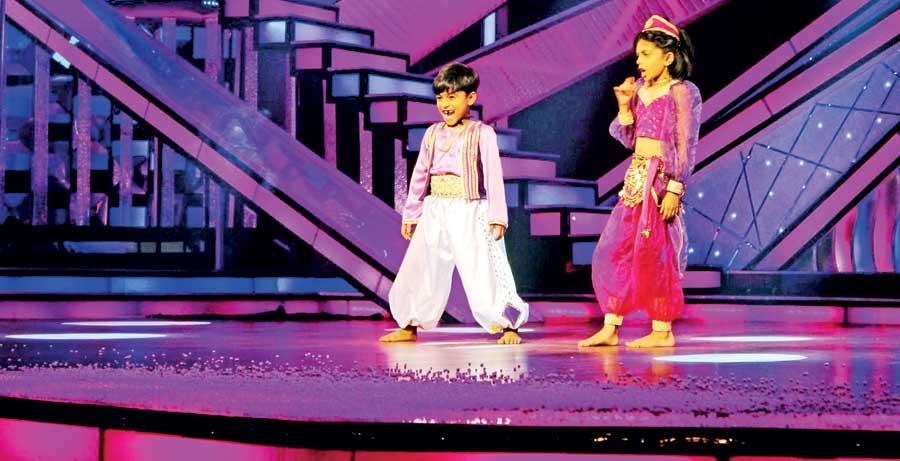
 ost Television channels find that reality shows cost money since the contestants are not
ost Television channels find that reality shows cost money since the contestants are not  celebrities. But average people including children don’t have to be paid. Viewers do not expect competitors to be celebrities or popular.
celebrities. But average people including children don’t have to be paid. Viewers do not expect competitors to be celebrities or popular.
Likewise, these reality shows are not only popular among viewers; they also bring in millions through sponsorships, marketing, and advertising. It is also understood that some companies provide costumes and other facilities given that the shows are popular.
One Television channel is hosting eight ongoing reality programmes at present while some others have four or five. Most of Sri Lanka’s reality shows feature singing or dancing competitions while recently we saw a different stunt show too.
Many of the talent shows being telecast in Sri Lanka at present are like copies of well - known foreign Reality shows such as ‘American Idol’ in the United States, ‘The X Factor’ in Britain, ‘Strictly Come Dancing’ also in Britain, ‘The Voice’ and ‘Dancing with the Stars’ in the US. ‘Survivor’ and ‘Big Brother’ are some of the adventurous reality show that Sri Lanka has still not copied from. There will be more adventure type reality shows that depict violence and cruelty.
The Collins Dictionary defines “Reality Shows” as follows: “A reality show is a type of television program that aims to show how ordinary people behave in everyday life, or in situations, often created by the program makers, which are intended to represent everyday life.”
How valid is it to call singing and dancing shows ‘reality shows’ when the term means something else leaves a question mark. Sri Lanka seems to be copying directly from western TV channels.
Professor Daya Amarasekara of the Department of Sociology at Peradeniya University was highly critical of these reality shows.
“The society has rapidly changed due to these reality shows. Reality shows are representing a modernised society that directly affects the thinking patterns of people since this audiovisual medium has the power to do so. Social institutions are also changing fast as a result of reality shows. Social Media largely contribute to this.” Professor Amarasekara said.
“Reality shows change social values and norms. Human beings have self-identities and these reality shows are defacing the self- identity by producing wrong impressions on self and the society. This fake world depends on fake status and fake recognition; individuals get themselves trapped in self-deception. The Sooner they realise this and 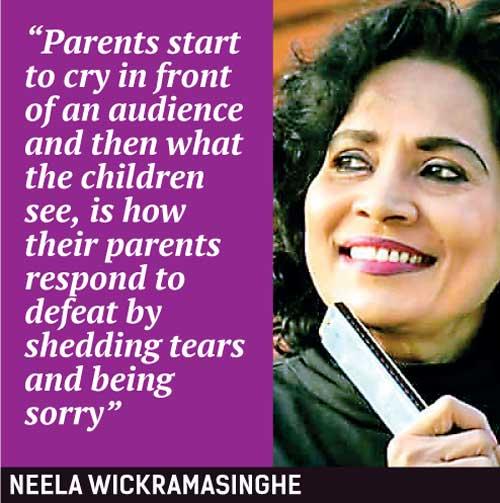 return to the reality of real life, the better it would be for them. The worst influence of reality shows is, creating people with falsified personalities. ” Professor Amarasekara said.
return to the reality of real life, the better it would be for them. The worst influence of reality shows is, creating people with falsified personalities. ” Professor Amarasekara said.
These highly marketable shows change social mobility. In recent history, there was no other time during which people tried to climb the social ladder other than by using education, for which only knowledge mattered, not the attitude.
The sociologist said reality shows produced stars who lived in an artificial and fake world and they did not realise their responsibilities to the country.
“The young generation taking part in and enjoying reality shows interact with machines, they carry relationships with the world outside through internet while avoiding real human interactions. They do not develop humane qualities like listening to others. What they have are the qualities of the reality stars and the levels of their behaviour is promoted by reality shows.
They see the world in the perspective of a star, looking down upon society. There is a cultural gap between parents and their children and parents cannot approach the activities of their children since the young generation is interacting with machines and communicating in English. This gap disturbs the social adaptation and harms the vital social institution called a family. Even if they need someone to listen to, love and care for them, there is no one. Some parents do not pay attention to their children’s emotional and mental needs, sometimes they do not care. Reality shows convey society, a message that is extremely harmful.” Professor Amarasekara said.
Similar views were expressed by Dr. Swarna Wijethunga, a Child Psychiatrist at the Lady Ridgeway Hospital.
“Children are not miniature adults and there is a healthy mental capacity in children who are undergoing different development stages. The way children see challenges and face criticism differs from each other, mainly depending on the personality of each child.
“There are reality programmes starting from age 4 and continuing upwards to adolescence. Sometimes there are no age limits. Most people are looking at those stages and the children are not expected to behave freely on the stage. Some teachers and parents virtually persuade children regarding the way they should act on stage. Parents are the role model for children.
“What the participants have to do in those reality shows is inappropriate compared with their age. They are dressed in revealing clothes and costumes, imitating elders.
“It is not what they want to do. They are doing what they have been told to do on stage, by their parents or the producers of the TV programme. When we load little minds with these unbearable pressures and competency, anxieties build up in their minds. Failure affects their minds more than any victory. These reality shows should have child - friendly activities.” She said.
Then according to Dr. Wijethunga, the qualities children have to bear throughout the programs are not so good for them, they are competing with each other, thinking and working selfishly and planning to win somehow. They will have weakened social skills and values by following these thinking patterns. Their artistic abilities would grow faster while the other qualities and good values would not. They won’t have a well-balanced personality. We should treat children like children, instead of forcing them to chase after money, popularity or personal glory. Engaging in these activities would also affect their physical growth.
But different views were expressed by Upuli Wijewardane, A judge of an ongoing reality show and a professional dancer and a dancing teacher
“If not for these shows, we won’t be able to experience the talents of skilled village children, who are participating in these reality shows. They develop their social abilities besides their dancing skills.
“A sound foundation is necessary for any academic and these reality shows place talented children on a platform that draws attention and contestants should be able to use this opportunity wisely to build their future or their 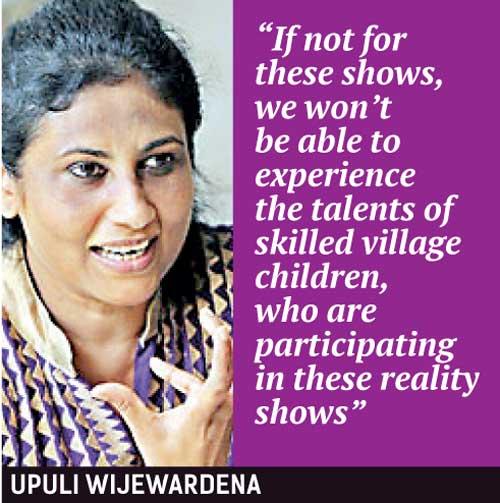 profession. It is better if they have opportunities to study further in foreign institutions with proper guidance. At least the parents should realise their child’s talents and guide them accordingly.
profession. It is better if they have opportunities to study further in foreign institutions with proper guidance. At least the parents should realise their child’s talents and guide them accordingly.
“In reality shows, the content should comply with the mentality of children. When commenting on performances, we choose our words carefully, so as to not hurt our little contestants, but to encourage them. Some parents themselves become the worst critics of their children, hoping to popularise them and eventually, the fame and the stardom would blow up like a balloon. Parents should take good care of how they guide their child through the competition and how to use this opportunity for the betterment of their children’s future. If children take the stardom too seriously and think “I am the Star”, their success would be ruined soon” she said.
According to Wijewardena, the words spoken affect the life of the children. They won’t be able to bear negativity if they think they were rejected on stage. The judges should have some psychological guidance before speaking to children.
“Some Channels are guiding parents of contestants to dress them accordingly and select a suitable choreography. Costume designing is done mostly by those who do not have an adequate understanding of the aesthetic appeal of a costume or how to choose fashion for children. Most of the contestants are from remote villages and do not have that taste or the understanding of aesthetic appeal. That’s how the revealing costumes are made.” She said.
According to Wijewardena, parents must have good control over their children and then they won’t pick up wrong values. After winning or losing at the competition, parents must know to lead their children towards a better future.
Commenting on reality shows and their negativities, Civic rights activist Savithri Gunasekara lashed out at the trend where children were being used for advertising. She said that while we did little or nothing to protect our children from advertising, Australia, for instance, has a rule not to use children for fast food advertisements.
According to Professor Gunasekara, advertising has a toxic effect on children anyway.
“Little girls apply for competitions wearing heels. There are far more complicated issues which pave the way for more serious matters like child abuse. She said the National Child Protection Authority (NCPA) should have discussions with the corporate sector and introduce laws to protect children from being misused or abused,” she stressed.
Artist and Music teacher Neela Wickramasinghe said that children had several developmental stages in their lives 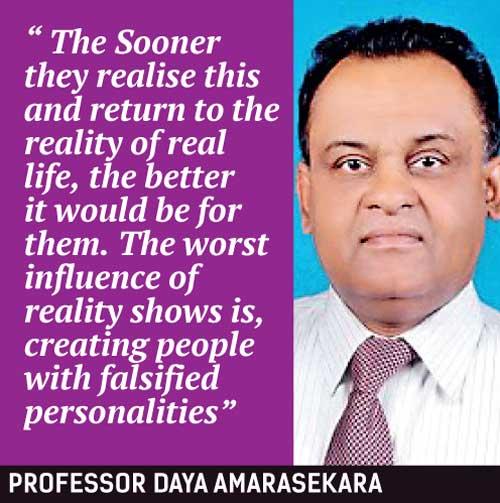 and the most critical time of a child’s life is the childhood.
and the most critical time of a child’s life is the childhood.
“Children learn how to respect elders, how to behave, the culture, the norms, customs and the religion in their childhood. Parents and elders are responsible for how the child develops his or her perception of the world. There’re things a child should and shouldn’t do. It is inappropriate for them to behave like elders. Yet, unfortunately, childhood is stolen from them. There’s little or no childhood for them and they have reached the young age while still being in their childhood.
“Sri Lankan reality shows are inappropriate for children. In singing competitions, they are singing songs suitable for elders. Parents or elders should guide them, helping them to select the best songs for their competitions, instead of love songs. They are dressed like young people and children think of themselves as adults and arrive at the conclusion that they are elders and therefore need not listen to elders. Parents also try to persuade children to follow their incomplete dreams and run after publicity. Most children are no more innocent or childlike”.
“Parents should think what their child is going to do for the country in the future. Without good qualities, customs, and religious practices how are these children going to behave when they grow up? Therefore I see more negatives than positives in these reality shows. I especially request parents, teachers, and elders to let the children live freely, let them spend their childhood and let them be responsible citizens and good-natured humans.
“Another disadvantage of reality shows is that children do not learn how to bear victory and defeat alike. Parents start to cry in front of an audience and then what the children see, is how their parents respond to defeat by shedding tears and being sorry. Parents should set a good example in how to bear defeat and victory alike, and explain to them that one loss doesn’t ruin their life” Wickramasinghe said.
According to the Article 18 of Convention on the Rights of the Child - (CRC), “States Parties shall take all appropriate legislative, administrative, social and educational measures to protect the child from all forms of physical or mental violence, injury or abuse, neglect or negligent treatment, maltreatment or exploitation, including sexual abuse, while in the care of parent(s), legal guardian(s) or any other person who has the care of the child..”
According to the Article 32 of CRC, “States Parties recognize the right of the child to be protected from economic exploitation and from performing any work that is likely to be hazardous or to interfere with the child’s education, or to be harmful to the child’s health or physical, mental, spiritual, moral or social development.”
According to the Article 36 of CRC, “States Parties shall protect the child against all other forms of exploitation prejudicial to any aspects of the child’s welfare.”
We cannot brand reality shows entirely good or bad either. Because there are obvious advantages like producing celebrities out of ordinary people within a very short period, and the not so visible bad results such as exploiting children. Anyway all these shows that target children should have child – friendly qualities and maintain standards to protect children from physical and mental harm whilst developing their social skills and talents. Parents also have a huge responsibility in protecting their children from the evils of realities. Therefore we have to find a middle–ground with regards to the reality TV shows in Sri Lanka.
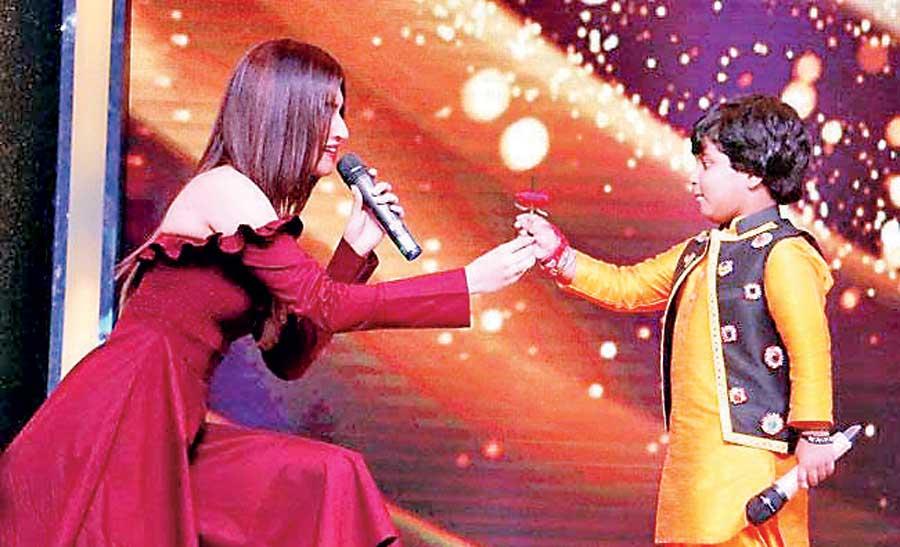
20 Apr 2024 1 hours ago
20 Apr 2024 2 hours ago
20 Apr 2024 2 hours ago
20 Apr 2024 2 hours ago
20 Apr 2024 3 hours ago